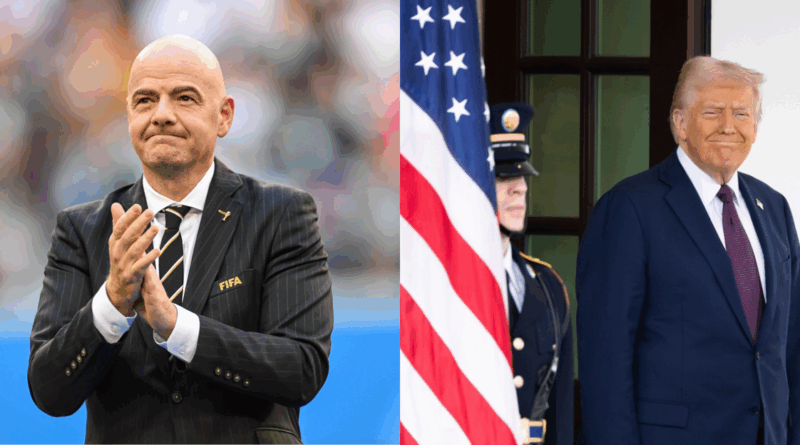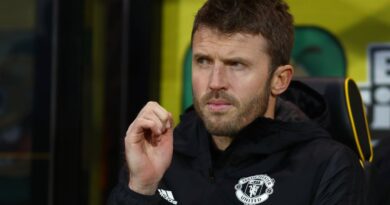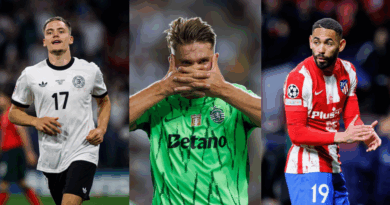Trump’s World Cup comments put Infantino on the spot
With less than a year until the 2026 World Cup, FIFA president Gianni Infantino is facing renewed scrutiny over the organisation’s relationship with U.S. political power an issue that has become increasingly difficult to ignore after a series of high-profile appearances alongside Donald Trump.
The most recent moment came this week during a meeting at the White House, where the former president discussed potential adjustments to the World Cup’s U.S. host cities. His remarks, and Infantino’s presence beside him, have revived a broader debate about the political pressures shaping preparations for the largest tournament in FIFA’s history.
A debate rekindled in Washington
During the Oval Office session, Trump suggested that matches could be reassigned from certain cities if federal authorities deemed a venue unsafe or non-cooperative.
The Guardian reported that his comments appeared to target cities led by political opponents, though no formal criteria were outlined.
Read also: Littler’s darts playfulness leaves rivals helpless, says Van der Voort
Infantino who has long maintained that football should operate independently of politics offered no visible objection. Analysts say this silence could signal a shifting balance in FIFA’s public posture, especially as U.S. officials take a more assertive role in preparations for 2026.
Patterns that preceded the latest flashpoint
This week’s meeting is the latest in a string of politically charged appearances by the FIFA president. According to The Guardian’s reporting, Infantino attended a White House-backed Middle East summit last spring, arriving late enough to FIFA’s own congress that UEFA delegates staged a brief walkout.
He later appeared at regional discussions on Gaza in Egypt and announced a new FIFA “peace prize” to be unveiled at the 2026 tournament draw in Washington. The move sparked commentary within European football circles, where some officials questioned whether the award risked becoming another political gesture rather than a sporting honor.
Sports governance experts note that while FIFA presidents have always interacted with heads of state, few have done so with Infantino’s frequency or visibility in the United States.
Read also: Kane’s next step: Bayern stability or Barcelona opportunity?
An unusual shift in influence
Historically, host governments have conformed to FIFA’s requirements often adjusting laws, policing, and commercial regulations to satisfy the organisation’s demands. The relationship now appears to be evolving in the opposite direction.
Analysts quoted by The Guardian and other outlets say the 2026 tournament is testing new boundaries in political influence. Trump’s suggestion that host cities could be replaced marks a departure from past practice; such a move has no precedent in the World Cup’s 95-year history.
The uncertainty presents a practical burden for international fans, many of whom are preparing for long-haul travel and steep accommodation costs. Several sports tourism consultants warn that even hypothetical venue changes could affect insurance, planning, and ticket resale markets months before the event begins.
The fan experience and rising costs
Amid political questions, supporters have also expressed concern about affordability. FIFA’s introduction of dynamic pricing a model that adjusts ticket prices based on demand has pushed some seats beyond the budgets of average fans.
Read also: McLaren seeks rule rethink after Las Vegas technical disqualification
If matches are relocated, travel costs could rise sharply, especially in a tournament spanning the United States, Mexico, and Canada.
Andrew Giuliani, who heads the U.S. World Cup taskforce, has portrayed the event as a major cultural milestone and credited Trump’s role in bringing it to North America. Infantino has echoed that optimism, calling the 2026 edition “the greatest and most inclusive World Cup ever,” according to The Guardian’s coverage.
But critics argue that the reality for fans may feel less inclusive, given rising prices and the uncertainty surrounding venue stability.
A broader conversation about FIFA’s direction
Infantino’s tenure has overlapped with a global reckoning over “sportswashing,” a term describing the use of major sporting events to bolster political agendas or soften national reputations. Once limited to human rights groups and academic circles, the idea is now widely understood by football supporters worldwide.
Read also: McLaren fired me on my birthday and cut the wrong driver
FIFA’s expanding slate of awards, ceremonies, and political-stage appearances including the new peace prize has intensified debate over the organisation’s independence. Some governance experts warn that the line between diplomacy and political endorsement is becoming increasingly blurred.
As the 2026 World Cup approaches, FIFA faces a dual challenge: managing the logistics of its largest-ever tournament while reassuring fans and officials that geopolitical considerations will not overshadow the sport itself.
Sources: The Guardian.
Read also: Mathias Gidsel played two months with a broken sternum




